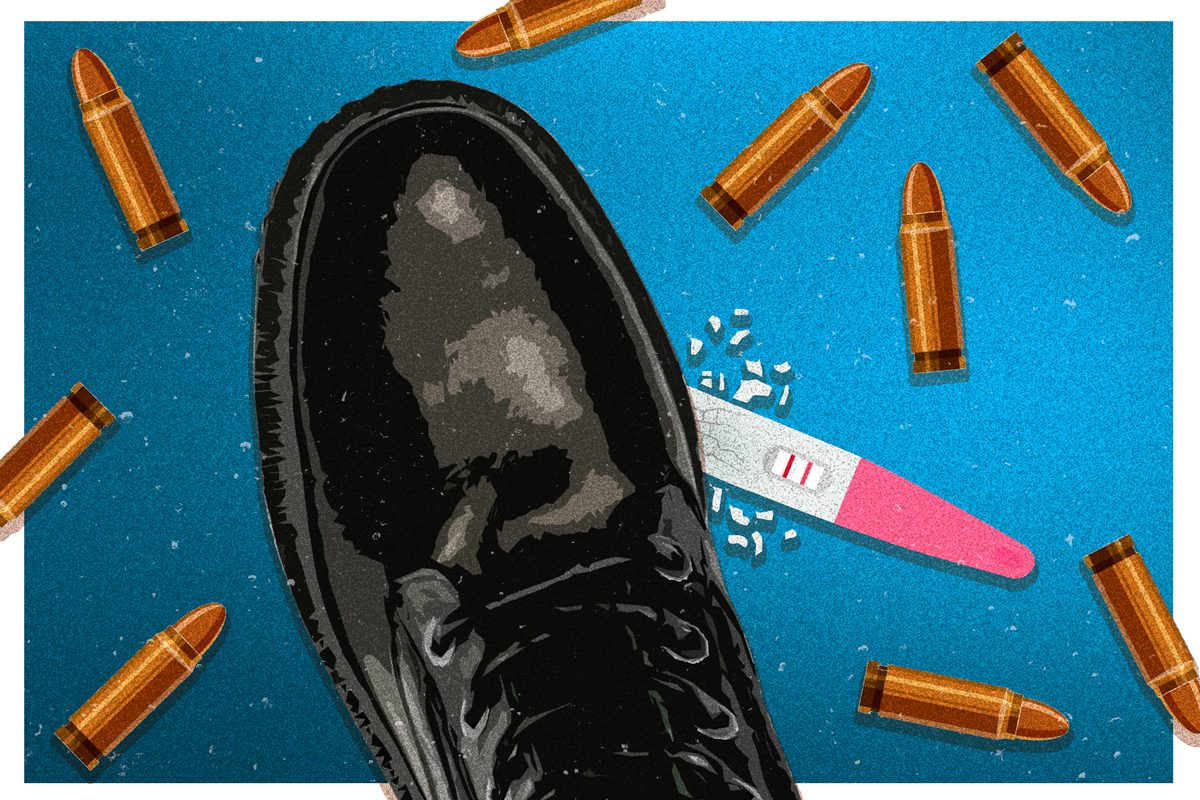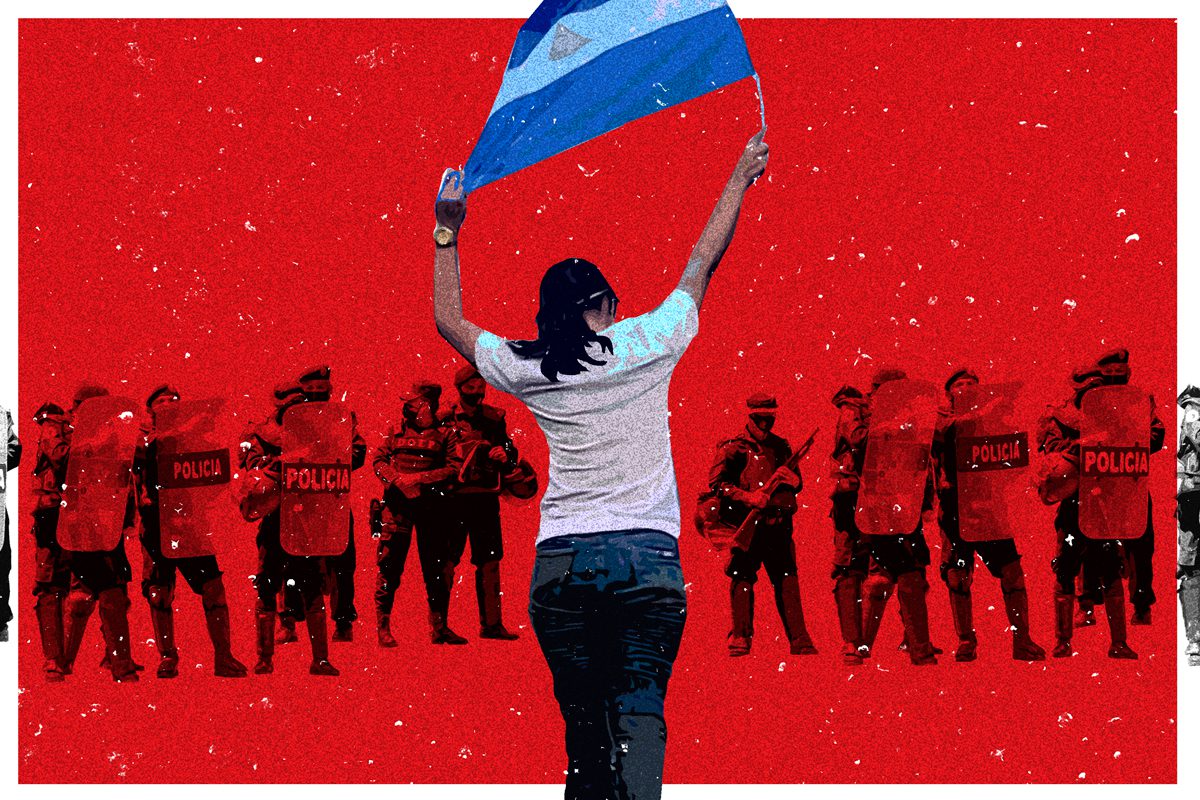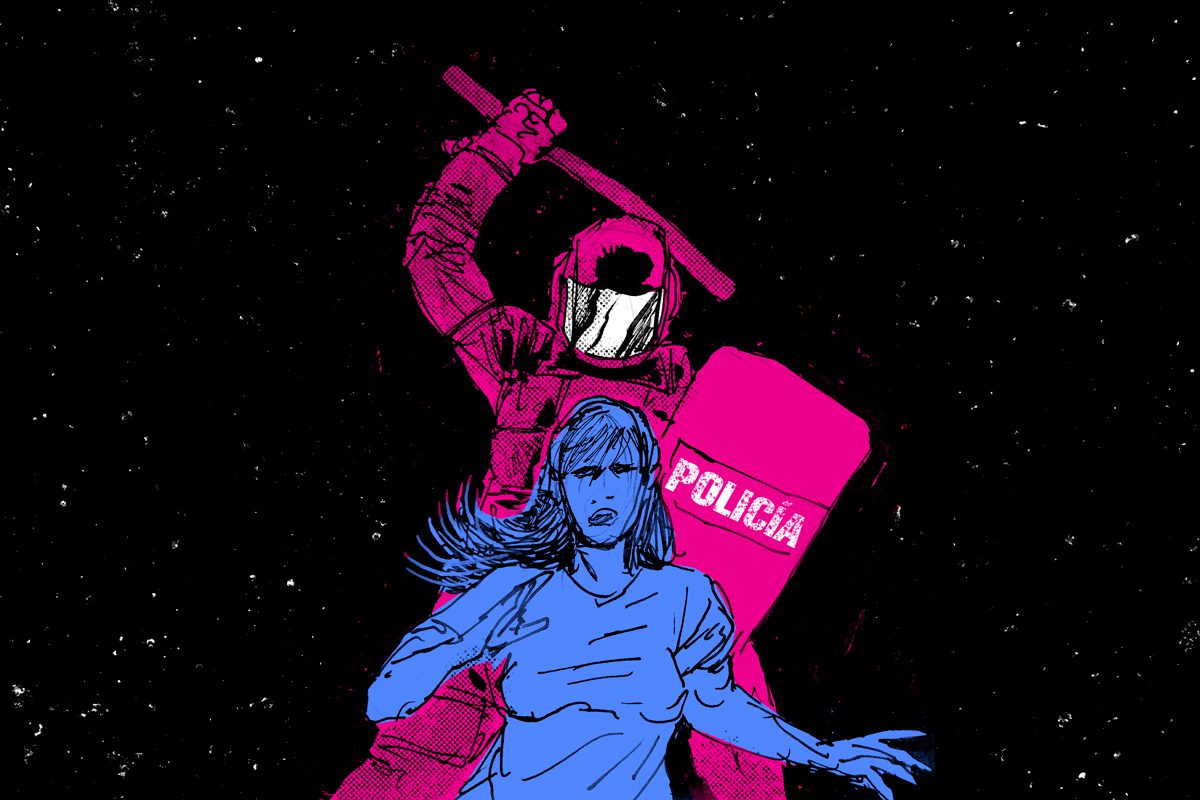When Angela saw that the pregnancy test came back positive in April 2022, she had many mixed feelings. Something deep inside her wanted to continue with her pregnancy, but not in the conditions she was in, the then 21-year-old told DIVERGENTES.
“I am a victim of political persecution by the Ortega-Murillo regime,” she explained. Angela was a feminist activist and also a journalist. In less than six months she had been forced to move three times because of harassment and arrest threats from the police, paramilitaries and fanatics of the Sandinista Front. Patrol cars always appeared at the houses she moved into and chased her wherever she went.
“I was very affected, I wanted at some point to consciously get pregnant and see my belly grow, but I was afraid because I was being politically persecuted. I thought, what will happen if one day the police catch me and I have a six-month belly? Are they going to make me have an abortion? Under what conditions will I have an abortion? What if they make me have a baby in jail?” the young woman wondered.
Angela could not even imagine herself in the near future as a mother because she saw herself in jail, along with the more than 200 political prisoners who were being held at that time in Nicaraguan prisons. The only thing she had in mind was to protect her safety, so terminating the pregnancy was the option she finally decided on. From this point on, another ordeal began for the young activist.
Nicaragua is one of the three countries in the Americas that absolutely criminalizes abortion, even when the woman’s life is at risk, when the fetus has no chance of life and when the pregnancy is the result of rape, according to Amnesty International. The procedure was unconstitutionally criminalized in 2007 by the Sandinista regime, despite being a violation of human rights and a form of discrimination against women, according to the World Health Organization (WHO).
Women who decide to terminate their pregnancies have to do so in clandestinity, often in an unsafe manner and without medical guarantees. Although this criminalization affects all women, adolescents and girls in the country, since the beginning of the socio-political crisis, it has had a particular impact on women activists who are persecuted by the regime, explained Mariana, a human rights defender who spoke to DIVERGENTES on condition of anonymity.
According to the defender, women activists do not have access to the health services provided by women’s rights organizations that were shut down by the Sandinista regime. Those who have decided to terminate their pregnancies are afraid to go to medical institutions because of the risk of being arrested for their activism and for committing “a crime”. In other words, the risk for them is twice as high under the administration of a dictatorship such as the Nicaraguan one.
Absolute silence on abortion

This basic right to health is non-existent in Nicaragua. If it used to be complicated to talk about abortion in the country, now it is totally forbidden, said sociologist and feminist María Teresa Blandón.
“Many of the activists and people who supported (the interruption of pregnancy) have had to leave the country or are in exile, and people who might have had some sensitivity in health institutions are now more afraid,” she explained.
The absolute silence on abortion in Nicaragua is also due to the arbitrary closure of feminist organizations, which to date, 212 have been stripped of their legal status, according to data from the Mesoamerican Initiative of Women Human Rights Defenders (IM-Defensoras).
“No one is talking about sexual and reproductive health, including the issue of unwanted pregnancies, pregnancies resulting from sexual violence or high-risk pregnancies,” Blandón said.
The lack of information on abortion is also more palpable than ever. In Nicaragua there is no information on the number of women who have medical complications or die due to clandestine abortions. According to the WHO, 45% of abortions in the world are performed under dangerous conditions.
The socio-political crisis has exacerbated the helplessness of women to make decisions about their bodies and pregnancies. According to Blandón, no one knows what is happening in hospitals and the impact that the criminalization of abortion has on women’s lives. The prohibition of abortion with and without repression has deeply violated women’s bodies, she says, but now it is impossible to defend that right.
Although the State and health institutions are aware that abortions continue to be performed clandestinely, they have never been responsible for guaranteeing women’s sexual and reproductive health. On the contrary, since the beginning of the crisis, the Ortega-Murillo regime has kept it in a state of total abandonment.
This situation is exacerbated by the arbitrary closure of all feminist organizations that before their cancellation provided medical services focused on sexual and reproductive health, especially for women, adolescents and girls living in poverty in urban and rural areas.
After the closure of these spaces, the regime has not guaranteed these services that were interrupted, but rather the services that were already offered from the health institutions are increasingly deteriorating, as in the case of Casas Maternas, added Blandón.
“What we know is that women, especially the poorest women in urban and rural areas, say that on many occasions they do not go to hospitals because they are not attended to, they get their pap smear results late, they are not provided with contraceptive methods or they are not allowed access to permanent contraceptive methods because they are told that they are too young or have too few children,” she explained.
“I don’t want my child to be born in a dictatorship.”

Angela made the decision to terminate her pregnancy because she did not want her child to be born in a context of persecution or jail. Her work as an activist and journalist put her in the spotlight of the Sandinista regime.
“I don’t want a child of mine to be born in a dictatorship. I can’t imagine raising someone if I have traumas from everything that has happened since 2018. It’s terrible that I had to reject my life as a mother because of the regime, how far have these people gotten into our lives?” the now 22-year-old expressed.
To continue with the termination process, Angela contacted a trusted gynecologist who helped her continue the procedure safely from home. Before the procedure, however, she had to move again because of police harassment where she lived.
Once in a safe place, in the company of her partner and with the accompaniment of her doctor by telephone, she followed the process as instructed. It was an 18-hour process, with bleeding and pain. It was also 18 hours of worries, fears and doubts. Although Angela had already accompanied friends to terminate their pregnancies, experiencing it was quite different.
“Even though we have an abortion by choice, it is still a process of mourning. These are physical and emotional changes that activate all the social constructs that we are taught from childhood and the guilt that is imposed on us,” the young woman explained.
In addition to the fact that abortion is a physical and psychological process that can be complex for women, performing it clandestinely, living it secretly and carrying the social stigma makes it even more difficult. “I had to hide it from people and recover in silence. I didn’t tell anyone, my parents didn’t know,” Angela said.
Only two months after this, she had to go into exile from Nicaragua along with more than a dozen other journalists, following a new wave of arbitrary arrests by the police.
She is currently in a European country as a refugee, without the possibility of returning home and to her country which is experiencing a more repressive context for the independent press: at least 93 Nicaraguan journalists went into exile during 2022, according to Voces del Sur, and there are about 185 journalists exiled since the beginning of the socio-political crisis, according to a systematization carried out by the Freedom of Expression and Democracy (FLED).
Despite being forced to leave her country, exile showed Angela that she made the right decision for her life. “I had to leave Nicaragua after that situation and I am thankful I was not pregnant. I can’t imagine currently being in exile and raising a baby,” she said.
While in Nicaragua Ángela lived through the interruption of her pregnancy full of fear because of the criminal dangers it entailed, in the country where she is now, women experience it differently.
Angela says that so far she has accompanied two friends to have this procedure and they had no complications in accessing it. She also points out that during the gynecological checkups she was even asked if she had ever had an abortion, as this is necessary information for women’s medical history.
“The violent and repressive laws that Ortega and Murillo have taken against women force women to decide between life and death when we are faced with an abortion,” she says.
Central America, a region with sexual and reproductive rights in decline
Central America is the region of the Americas with the most restrictive sexual and reproductive health policies. This region is home to the only three countries that absolutely criminalize abortion: Nicaragua, Honduras and El Salvador, the latter being the most restrictive in the world, as it even penalizes abortions for obstetric emergencies.
And although Guatemala and Costa Rica have decriminalized abortion on health grounds, in reality the institutions very rarely guarantee this procedure to women who need it, reveals the study Laws and Shadows: Abortion Regulations in Latin America and the Caribbean, carried out by the Latin American Consortium Against Unsafe Abortion (Clacai).
So in practice, access to abortion in Central America is almost impossible, regardless of the circumstances in which women, girls or adolescents find themselves. Despite the fact that countries have international commitments to guarantee this health service, States refuse to change their legislation.
The latest case that shook the region was the Beatriz vs. El Salvador lawsuit in the Inter-American Court of Human Rights (IACHR). This is a lawsuit in which the State of El Salvador is accused of violating Beatriz’s rights by denying her a timely termination of pregnancy, when it was a necessary procedure to save her life due to her high-risk pregnancy.
This is the second trial that El Salvador has been subjected to for violating the sexual and reproductive rights of women who need to terminate their pregnancies. And a ruling in Beatriz’s favor could mean hope for Salvadoran and Central American women, which in addition to setting a precedent for the need to guarantee this service, could change legislation.The impact that the criminalization of abortion has had on women in the region and on activists and human rights defenders in Nicaragua is uncertain, says Mariana, a feminist defender. However, like Ángela, they all have access to it with risks, fears and in secrecy, in full awareness of the State.





